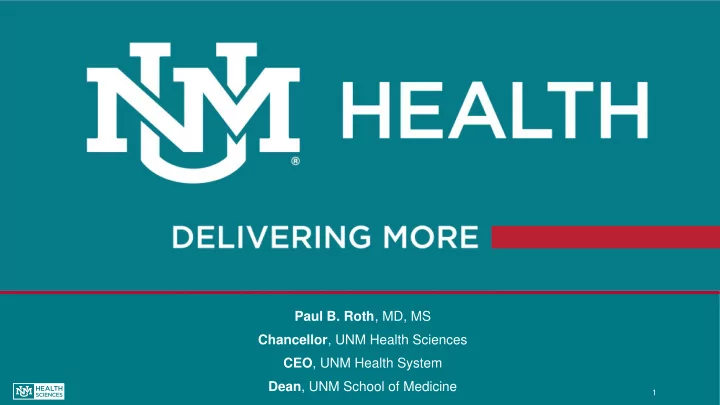

Paul B. Roth , MD, MS Chancellor , UNM Health Sciences CEO , UNM Health System Dean , UNM School of Medicine 1
Overview: Neurosurgery Residency Accreditation Withdrawal •Dr. Fair will speak to details leading up to withdrawal and plans going forward •Dr. Richards will speak in reference to the continuity of clinical affairs 2
Dr. Joanna Fair Associate Dean of Graduate Medical Education and DIO Vice Chair of Education, Radiology Associate Professor of Radiology/Nuclear Medicine University of New Mexico 3
Medical Education • University +4 • Medical School (MD) +4 +3-7 • GME- Residency +1-3 • GME- Fellowship • Clinical Practice Accreditation Council for Graduate Medical Education (ACGME) 4
Graduate Medical Education
GME: ACGME Key Components and Process RC • Accreditation Council for Graduate Medical Education (ACGME) - Each UNM residency and fellowship program is accredited by the ACGME • Review Committee (RC) = One of many ACGME committees that set accreditation standards (requirements) and evaluate institutions or programs to assess their compliance with requirements DIO Each year, every ACGME-accredited program and institution are reviewed by their specialty-specific or institutional Review Committee • Designated Institutional Official (DIO) = The person in a Sponsoring Institution (e.g., UNM) with authority and responsibility for all that institution’s ACGME-accredited programs GMEC • Graduate Medical Education Committee (GMEC) = The institution’s committee (made up of program directors, residents, hospital representatives) also responsible for the institution’s programs Program •Program Director- The individual designated with authority and Director accountability for the operation of a residency/fellowship program
Neurosurgery Residency Program Chronology: • May 2018- ACGME survey results received • August 2018- ACGME provides copy of complaint received from Residents • DIO, Program Director, and institution work on response to concerns • August 2018- Chair agrees to retire effective Dec 31, 2018 • December 2018- Accreditation Council for Graduate Medical Education (ACGME) residency site visit • January 2019- Neurosurgery Interim Chair appointed • February 2019- Probationary Accreditation of the residency program • 14 citations; revised and continued an aggressive action plan • March 2019- Replaced Neurosurgery Program Director with a New Program Director • June 2019- Second ACGME Neurosurgery Residency Site Visit • August 2019- ACGME withdraws accreditation of the Neurosurgery residency program effective June 30, 2020 Those completing residency in June 2020 will graduate from an accredited neurosurgery program 7
Key Responses to Concerns 1. Implemented multiple faculty development and feedback sessions with assistance of Dr. Gary Smith (UNM Office of Medical Education Development) and Dr. Dave Stromberg (UNM SOM Feedback Initiative) 2. Monitored and addressed duty hours violations and created culture of accurate reporting; ensured confidentiality of evaluations and appropriate supervision 3. Increased communication - Implemented frequent (at least monthly) meetings between Program Director and residents 4. Brought in GME Wellness Director Eileen Barrett to facilitate wellness sessions with faculty and residents 5. Implemented frequent monitoring of neurosurgical case volumes for each resident 6. Reassured residents they could report concerns to DIO, Dr. Fair. 7. Hired Dr. Botros (pediatric neurosurgeon) and Dr. Ricks (spine/critical care neurosurgeon). (Botros- Aug 2018/ Ricks- July 2019) 8
Highlights of ACGME Findings in August 2019 1. Educational program ◦ Lack of structure, lack of stability with recently instituted changes, faculty insufficiently engaged in teaching/feedback, lack of stability in evaluation processes 2. Institutional support for PD, chair, faculty ◦ Chair hiring, faculty hiring, program director protected time, program director scholarly activity, junior faculty, and faculty development – lack of demonstrated sustainability of changes 3. Institutional support for the clinical mission ◦ ORs, operative case volumes, APPs – primarily new citations (facilities—clinical space; service to education imbalance) 4. To a lesser extent, mistreatment of NSG residents ◦ The most recent letter describes improvement in this regard (but we still have the citation) 9
Neurosurgery Residency Program Immediate Response to accreditation withdraw: •Established a critical incident task force to develop an implementation plan for five primary areas: 1. Support of our current Neurosurgeons (ongoing) 2. Replacement of residents with other clinicians (ongoing) 3. Recruitment of Neurosurgical Chief (completed; new hire begins February 2020) 4. Prevention of Reoccurrence 5. Reaccreditation (timeline of 2-3 years) •10 residents impacted Financially assist 8 Neurosurgery Residents in new placement transitions Most residents departing by the end of the calendar year •Additional resources through the Learning Environment Office and Office of Professional Wellbeing 10
Looking Forward •Plan is to seek reaccreditation, contingent upon: (2-3 year timeline) • New chair • Select a new program director • Create a new program application with a robust educational and clinical training program • Rebuild the didactic structure • Build more comprehensive clinical experience 11
Dr. Mike Richards Mike Richards, MD, MPA Senior Vice Chancellor for Clinical Affairs, UNM Health System 12
Continuity of Clinical Care Maintenance of Essential Services Revised Neurosurgical Model Resident Model “Community Model” Trauma program and accreditation Neurosurgery as consulting service Stroke Program Revised Attending Role Call Advanced Practice Provider (APP) Emergency Services Expansion a) Number of APPs Role of APPs Number of APPs Affiliated Program Expansion Second Trauma Service Neuro Hospitalist Program Critical Care 13
Neurosurgery: Moving Forward •Hired a new Chair of the Neurosurgery Department- Dr. Meic Schmidt ◦ Dr. Schmidt will bring 2-3 colleagues with him to the department ◦ To date, 23 new APPs have been hired or are in the hiring process •Clinical Partnerships • Build new clinical programs • Comprehensive clinical neurosurgical access •Contemporary model of the role of the learners •Cutting-edge technology in the new OR suites when the UNMH Tower is completed in 2024 14
Neurosurgery •We will continue to provide neurosurgical and trauma services to the state •Patient care has not and will not be impacted •We will maintain delivering on our mission to the State •We will reapply for reaccreditation 15
Thank you! QUESTIONS? 16
Recommend
More recommend